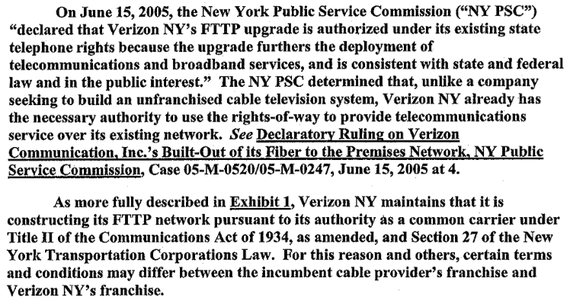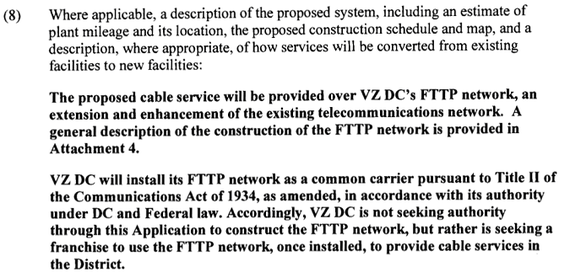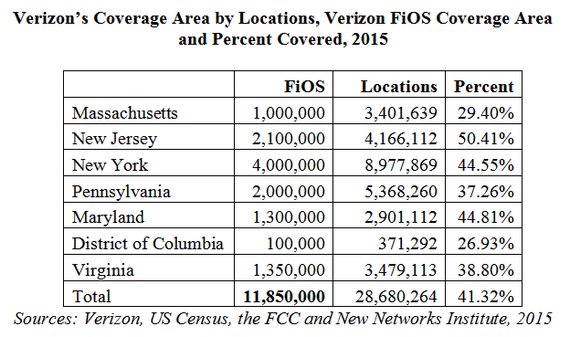I challenge Hal Singer, Senior Fellow at the Progressive Policy Institute, and FCC Commissioner Ajit Pai to a rousing debate, sponsored by the Internet Society, New York Chapter, who has agreed to host it.
Why? There has been a serious rewrite of history and the 'facts' have a different interpretation when all of the data is examined. (And I use the word 'pundits' as there is a whole class of 'experts' that have not bothered to examine the facts we are about to present, though I note much of their research contains phrases like "This report was prepared for Verizon", or "Thanks to AT&T for research funding".)
Commissioner Pai spoke at an American Enterprise Institute forum on September 9th, 2015. He said:
"When I first saw Hal Singer's research revealing the decline in U.S. broadband providers' capital expenditures, a statement by John Adams came to mind: Facts are stubborn things. And here are some of the stubborn facts that Hal uncovered. Capital expenditures by major wireline broadband providers plunged 12% in the first half of 2015 compared to the first half of 2014..."
"What's responsible for the recent drop in infrastructure investment? There's no disruption in the overall economy to blame. Instead, it's the FCC's decision to capitulate to the President's demands and impose Title II public utility regulation upon the Internet that is playing a large role. Numerous broadband providers told the FCC earlier this year under penalty of perjury that Title II regulation was leading them to cut back on infrastructure investment and broadband deployment."
Click: What is Title II?
And it appears that the goal of their examination is to make the phone and cable companies' case that the FCC's Open Internet Order, (Net Neutrality) which others have dubbed "Obamanet", is evil.
Let me uncover some facts about Verizon's use of Title II and broadband deployments that appear to have been miss-diagnosed -- and I'll quote the source, in this case, Verizon.
However, it is astonishing that Mr. Singer and Commissioner Pai have not bothered to mention the most obvious fact about the slow down of investment:
VERIZON HAS STOPPED UPGRADING THE NETWORKS OR MAINTAINING THE COPPER WIRES--AND HAS BEEN TALKING ABOUT IT FOR 6 YEARS!
I'll return to this in a moment.
1) Verizon's Entire FiOS Fiber Optic Deployment Is Based on "Title II".
First, Verizon's entire "FTTP", "Fiber-to-the-Premises" network that is used for FiOS services has been and continues to be classified as 'Title II', common carriage and a telecommunications service. (NOTE: FiOS is a brand name for a group of services that ride on this fiber optic network; it is NOT the wire itself.)
In 2005, Verizon was able to convince the New York State Public Service Commission (NYPSC) that FiOS was just an extension of the state utility networks. Here it is, in writing, by Verizon.
Verizon has used this exact same tactic -- i.e., making the fiber networks an extension of the regular state-based utility, in every state. Here's an excerpt from Verizon's District of Columbia proposed franchise agreement, circa 2007; it details that the fiber network is Title II and the deployment is based on the existing telecommunications networks.
Thus, claiming that Title II harms investment when Title II is the investment strategy is, well, wrong, or even deceptive.
2) Title II Didn't Harm Investment in Deploying Fiber Optics - It Is the Investment Mechanism.
In New York State, Verizon went back to the State after the 2005 decision and was able to get multiple rate increases to pay for fiber optic construction because as Title II, the company could use the state utility's maintenance and construction budgets, as well as charge local phone customers for the network upgrades.
In June 2009, the NYPSC granted Verizon NY the third rate increase on residential basic, copper-based phone service since 2006. The NYPSC press release explains that the rate increase was due to "massive deployment of fiber optics". (Elsewhere the State also pointed out that Verizon NY was "in need of financial relief" due to major losses.)
"'We are always concerned about the impacts on ratepayers of any rate increase, especially in times of economic stress,' said Commission Chairman Garry Brown. 'Nevertheless, there are certain increases in Verizon's costs that have to be recognized. This is especially important given the magnitude of the company's capital investment program, including its massive deployment of fiber optics in New York. We encourage Verizon to make appropriate investments in New York, and these minor rate increases will allow those investments to continue'."
In New York State, these rate increases on basic service added $750.00+ since 2006 per line, not counting the additional costs to add-on services like non-listed numbers. The release calls this 'minor' because it never audited Verizon's financial books, or even added up the increases that added 84% to just basic service.
The losses were based, in part, on Verizon Corporate dumping billions of dollars of expenses into local service, having other Verizon subsidiaries not pay market prices for services, or giving them access to part, some, or most of the utility construction budgets. (And these losses are NOT based on expenses related to offering the copper-based phone service -- there's no more advertising, marketing, no new construction and the staff has been slashed.)
3) Verizon Never Told the FCC that Title II was the Method of Investment
Funny, but Commissioner Pai claims that the companies, under penalty of perjury, told the FCC that the Open Internet Order and Title II would harm investment.
We filed a Petition for Investigation for perjury against Verizon as, truth be told, Verizon never mentioned to the FCC that their network investment plans were based on Title II.
4) The Re-Write of Broadband History
This ability to charge customers to fund broadband is NOT new, just ignored in the history laid out by Singer. And, unfortunately, more money was collected in the name of broadband than was ever actually put into construction.
For example, "Opportunity New Jersey", the Verizon NJ plan, was to have 100% of their state territory upgraded to fiber optics, with speeds capable of 45 Mbps in both directions -- starting around 1992 and completed in 2010.
The state laws were changed in 1992 (and finalized in 1993) to replace the existing copper wires with fiber optic wires, and in New Jersey there was even a timeline of when these networks were to be completed. We estimate that by the end of 2014, about $15 billion dollars was collected in just New Jersey.
Click to see Opportunity New Jersey Time Line
And though it varies by state as to the commitments and customer investment, this same plan played out in every Verizon, AT&T and Centurylink state -- formerly, the incumbent Bell phone companies.
Worse, these excess charges are still being collected today and built into rates as no state ever went back to stop the customer overcharging that was supposed to be used to build out the networks -- that were never built.
See: The Book of Broken Promises for details.
Verizon's FiOS, which was announced in 2004, came a decade after these laws were changed to build out the states' infrastructure. And yet, there is no mention of this on Singer's timeline of events -- and it happened in almost every state in the Union.
5)Verizon Stopped Upgrading and Maintaining the Wired Networks Starting in 2009.
And as mentioned, it is remarkable that Mr. Singer and Commissioner Pai have not bothered to mention the most obvious fact about the slow down of investment:
VERIZON HAS STOPPED UPGRADING THE NETWORKS OR MAINTAINING THE COPPER WIRES.
I.e., Verizon's expenditures on the wireline networks have been in decline for years and were set to slow down long before the Net Neutrality decision.
2009: In September, 2009, then-CEO of Verizon, Ivan Seidenberg, spoke at a Goldman Sachs investment meeting. According to the New York Times, the plan was to 'hang up' on the landline business.
"Verizon Boss Hangs Up on Landline Phone Business.
"Speaking to a Goldman Sachs investor conference, Mr. Seidenberg said Verizon was simply no longer concerned with telephones that are connected with wires. ...Not only does Verizon control the largest mobile phone company in the country, it has also largely moved away from copper wires. Verizon is selling off most of its operations in rural areas and is spending billions to wire most of the rest of its territory with its fiber optic network, or FiOS."
2010: Then, in 2010, this headline by the Wall Street Journal announced: "Verizon to End Rollout of FiOS".
2012: The halting of FiOS deployment has continued as a story over the last five years. For example, this headline from 2012 by Stop the Cap, states: "Verizon Won't Expand FiOS Beyond Current Franchise Obligations, CFO Tells Investors", Sept 25th, 2012
And in 2015,DSLReports summed up the current situation where recent calls to bring wired broadband deployment to cities throughout America's East Coast has fallen on deaf ears.
"With the exception of major city franchise obligations (and even those have lots of wiggle room), Verizon all but ended their FiOS expansion plans around five years ago. With so many un-served cities still begging to be upgraded Verizon continually has to remind folks that they're simply not interested in upgrading their fixed line networks any more. If you live in one of those un-upgraded cities like Buffalo, Boston or Alexandria, that's a tough pill to swallow."
And let us be clear; Verizon announced that it has been spending more on wireless than on the wireline networks, as of late. Quoting Fran Shammo, Verizon's CFO discussing the company's financials, January 22, 2015:
"I have been pretty consistent with this in the fact that we will spend more CapEx in the Wireless side and we will continue to curtail CapEx on the Wireline side... Some of that is because we are getting to the end of our committed build around FiOS, penetration is getting higher."
The entire East Coast of America is only partially upgraded, with an average of less than 50% coverage, regardless of the accounting being presented by Verizon, (which has not been audited).
And we know that simply taking Verizon's word for their deployments is very problematic. Verizon claimed it had fulfilled its obligations to wire all of New York City's residential dwellings.
Yet, the Consumerist headline, June 19, 2015, says it all:
"New York City Audit Calls Out Verizon for Failure to Build Out FiOS Network As Promised."
In short, the plan was already in place to slow down the investments of the wired networks long before the Net Neutrality Order passed.
6) The Other Companies' Investments are in Decline?
And, I'm surprised that Singer and Commissioner Pai didn't read the trade news.
AT&T: According to Lightwave, November 10, 2014, discussing AT&T's capex for 2015, the company was planning a decline in spending.
"Project VIP capex has peaked says AT&T.
"AT&T has said that investment in its Project VIP network enhancement program has peaked, and that capex for 2015 will therefore shrink from current levels. The pronouncement, tacked at the end of its announcement that it has acquired Mexican wireless network operator Iusacell for $2.5 billion, sent shares of optical technology stocks tumbling today."
And let us remember that "VIP" is based mostly on AT&T's copper-to-the-home service, U-Verse, where the company keeps telling everyone it is "fiber optic-based", but the reality is -- there is a fiber optic wire attached to a big box somewhere within ½ mile from the customer.
Comcast and Time Warner Cable? Their merger deal didn't happen so they are no longer on the hook to show that they are good corporate citizens and can drop the façade that they would invest heavily once the merger passed.
And if AT&T and Verizon, the wired competitors, aren't upgrading, why should they? In fact, they even have an agreement with Verizon to bundle their Triple Play with Verizon Wireless's service in areas that Verizon has not upgraded to fiber.
Gentlemen, why don't we let the public decide who has the 'facts'? The Internet Society, New York Chapter (Contact: ISOC-NY) has agreed to a host the debate; they are known for their live-streamed events as well. I look forward to an open discussion -- and just the facts -- just the facts.
NOTE: Hal Singer's bio at the Department of Justice includes "prepared several white papers and written testimony for clients, including (edited) AT&T, BellSouth, CTIA, Internet Innovation Alliance, Qwest, SBC, and Verizon. And a paper, "Unintended Consequences of Net Neutrality Regulation" from 2007 thanks "AT&T for research funding". It claims that "an FCC mandate on network neutrality would be detrimental to the objectives that all Americans seemingly should want--namely, the accelerated construction of next-generation networks, and benefits of lower prices, broader consumer choices, and innovations these networks would bring."



